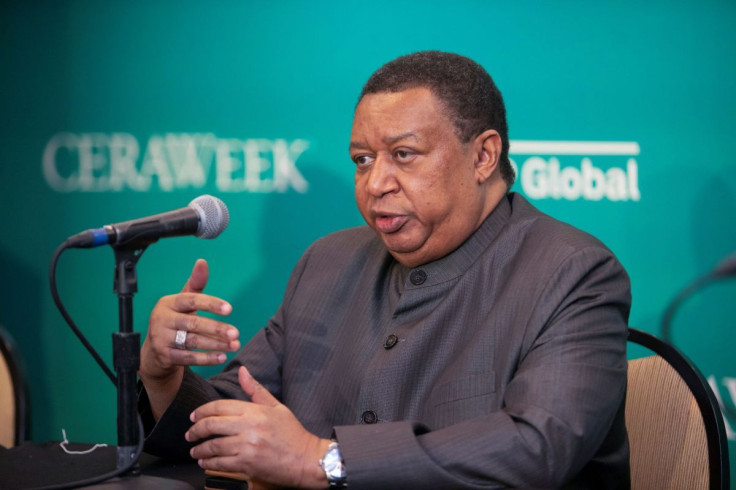With Bans On Russian Oil, Energy Execs Tell Governments: Work With Us

With crude oil surging past $125 a barrel, oil company executives called on Tuesday for more favorable global government energy policy to help the industry resolve the supply crisis that has deepened since Russia's invasion of Ukraine.
On Tuesday morning, President Joe Biden announced a U.S. ban on Russian oil and other energy imports, while Britain said it will phase them out by year end. Oil prices settled the session 4% higher and have shot up 30% since the invasion. [O/R] Russia exports 7 million to 8 million barrels of crude and products daily.
Even before the invasion, the oil industry had not kept up as demand rebounded to pre-pandemic levels. Several shale executives at the CERAWeek energy conference in Houston contended the market would not have been as tight had government been more supportive of the industry.
"We're happy to see the administration do whatever they need to do to be effective in trying to end this invasion," said Chesapeake Energy CEO Nick Dell'Osso. Chesapeake has had some "limited or light conversations with politicians in general" as oil prices have spiked, he said, but added, "We think there needs to be a lot more."
Scott Sheffield, CEO of Pioneer Natural Resources , said Washington should boost permits of natural gas lines, speed up permits for liquefied natural gas (LNG) facilities and encourage more leasing activity.
Oil executives supported the ban on Russian oil, but they have criticized the Biden administration since it imposed a temporary ban on new federal permits and canceled the Keystone XL project.
The administration has countered by saying that shale companies are sitting on 9,000 existing permits they have yet to use to boost oil output. U.S. oil company executives have cut drilling and exploration in response to shareholder demands for higher profit margins.
It is a myth that "the administration is somehow holding back or responsible for the industry not being able to produce," said Amos Hochstein, the U.S. State Department senior adviser for global energy security. "The bizarre thing to me is that it's not true."
Hochstein said he has been speaking with energy executives, asking them if they need assistance, "and they said 'no,' unless you can help me with sand or supply chains."
A source familiar with the White House's thinking said the Biden administration is mulling how much to cooperate with the U.S. natural gas industry, wary that any outreach would be seen by environmentalists as a capitulation.
At the same time, the source said the White House is concerned that the Ukraine crisis will be used by energy executives to push for unfettered development without newer technologies, such as carbon capture and sequestration, in place.
"Both sides have to come together and compromise," said the source, who declined to be named, citing the sensitivity of the deliberations.
U.S. oil output peaked at nearly 13 million barrels per day in late 2019, but producers cut activity drastically during the pandemic and output has not recovered - in part because oil company investors have urged shale players not to overspend.
Some shale executives said a rapid increase in output is not likely because supply-chain issues have raised costs. That points to more pain for consumers and businesses dealing with spiraling prices of diesel and gasoline.
And with major buyers effectively self-sanctioning Russia from global markets, executives warned there are few ways to replace Russia's exports and said governments need to plan for a long-term disruption.
"We need to think about this in the context of more than just a few months - heaven forbid this lasts more than a year," said Ryan Lance, CEO of ConocoPhillips .
Consuming nations have been pressing for faster output increases by Saudi Arabia, the de facto head of the Organization of the Petroleum Exporting Countries and its allies, known as OPEC+. But the group has limited spare capacity to produce more and some OPEC+ members are already struggling to hit existing production quotas.
Saudi Aramco Chief Executive Amin Nasser said Tuesday the mixed signals from policymakers are making the crisis worse.
"As oil and gas investments are discouraged, demands are being placed on our industry to increase production," he said.
The White House has also been pressing to revive a nuclear deal with Iran that would add barrels to global supply.
Skyrocketing oil prices underline the need to accelerate cleaner energies rather than having to rely on fossil fuel markets that are "vulnerable to bad actors," White House press secretary Jen Psaki said in a tweet this week.
Sheffield said the industry should be responding on its own as well. "We need to ask for more increased activity from all the shale producers, both oil and gas," Sheffield said.
© Copyright Thomson Reuters 2024. All rights reserved.




















